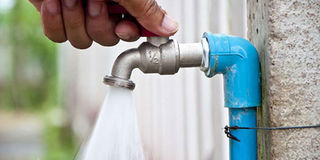Simple actions that go a long way in water conservation

Tap water. It is important to conserve this precious commodity. PHOTO | FILE | NATION MEDIA GROUP
What you need to know:
- As you prevent wastage around the house, it is also important to recycle the water used within the household.
- The good old method of collecting rainwater for supplementary use still works wonders when it comes to water conservation.
On February 11 this year, a rare spectacle played out in Karare, a remote village in Marsabit County.
County officials who had visited the area in a bid to drum up support for the establishment of a municipality in the county were left in a state of bewilderment as locals served them bottles of muddy drinking water.
The locals, who have been experiencing one of the worst water shortages in recent history, felt that the agenda of the meeting was a little bit off the mark as their most burning issue was access to clean water.
Their choice of communication might have been a little unorthodox, but the issue they raised is as valid in many places across the country and the world as it is in Marsabit.
HEALTH RISK
In Baringo, an MP has been reported as saying that residents are at risk of contracting waterborne diseases if they don’t get clean water.
Baringo Central lawmaker Joshua Kandie is quoted as saying that 70 per cent of the county is arid and semi-arid, leaving many residents suffering from lack of water.
Schools within the county are on the verge of closure as students join their parents in search of water for domestic use and for their livestock.
Meanwhile, the panic and distress that hit Cape Town, South Africa’s second largest city, as its authorities clamped down on the use of water a year ago, is still fresh in our minds.
The city became the world’s first major city to appear to be about to run out of water due to climate change.
CONSERVE
As the world marked this year’s World Water Day on Thursday, aptly themed ‘Leaving No One Behind’, it is important to reflect on measures that can be taken by all and sundry to conserve the commodity since the water crisis affects everyone, and no one should be left behind if conservation efforts are to bear fruit.
There are a number of measures we can take both as individuals and companies to ensure we conserve our dwindling water reserves.
At home, simple actions like turning off the water while brushing your teeth go a long way in water conservation.
There is no need to keep the water running while brushing your teeth; just fill a glass for mouth rinsing. The same is true for dish washing.
Don’t leave the water running while rinsing. It is advisable to fill a small basin with soapy water and another one with rinsing water rather than wash directly from a running tap.
RECYCLE
It is also important to ensure that all leaks, however small, are repaired. A small drip from a leaking pipe can waste up to 10 litres of water per day.
As you prevent wastage around the house, it is also important to recycle the water used within the household. Water used to rinse clothes can be used to clean the house or flush the toilet.
For those who use dish washers and drycleaners at home, consider buying machines from companies that have put an effort in reducing the amount of water their machines use.
Today’s modern, efficient machines take into account environment-friendly practices, and can save a great deal of water.
The good old method of collecting rainwater for supplementary use still works wonders when it comes to water conservation.
WATER STORAGE
Devise ways to save and store rainwater for use in cleaning and watering plants. While at it, you will save a lot of water when you use a watering can to water your plants as opposed to using a hosepipe.
When it comes to businesses and corporates, it has been a misguided assumption to overlook water conservation when coming up with environmental sustainability practices.
However, a reduction of water consumption per tonne of product by businesses and companies can go a long way in further conserving the water reserves that are continually being put under pressure by increasing manufacturing capacities.
AWARENESS
It is also important to educate employees on sustainable water use.
As things currently stand, Nairobi’s water supply is 20 per cent lower than required, and by 2035 it is expected to be more than 60 per cent lower than the projected demand.
The glass of sustainable water consumption is half full. In order to save this threatened resource, both citizens and manufacturers have an opportunity to reduce their water use by an average of 20 to 30 per cent through cost-effective interventions.
The writer is the Corporate Communications and Public Affairs Manager at Nestlé East and Southern Africa Region




